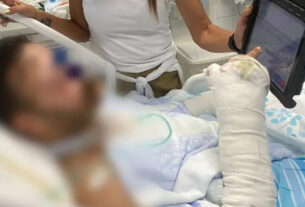Physicians and scientists have argued for years about what causes autism spectrum disorder (ASD), which refers to a broad range of conditions characterized by challenges with social skills, repetitive behaviors, speech, and nonverbal communication.
Available scientific evidence suggests that there are probably many factors that make a child more likely to have autism, including environmental and genetic factors.
Scientists have also proven what doesn’t cause ASD. These include measles, mumps, and rubella vaccines do not cause autism; neither do other childhood vaccines preserved with thiomersal contained in some inactivated vaccines.
Now, researchers at the Azrieli Faculty of Medicine of Bar-Ilan University (BIU) in Safed have identified a potential link between ASD and the composition of the gut microbiome – the collection of all microbes, including viruses, bacteria, fungi, and the genes that naturally live on and inside our bodies. Although microbes are so small that they require a microscope to see them, they contribute to human health and wellness in significant ways.
The researchers analyzed the diversity of the gut microbiome in a group of 96 Israelis who had been diagnosed with ASD and 42 people who did not suffer from ASD. Their findings, recently published in the journal Biofilms and Microbiomes under the title “Bacteroides is increased in an autism cohort and induces autism-relevant behavioral changes in mice in a sex-dependent manner” point to significant differences in both alpha and beta diversity in individuals with ASD. They identified specific types of bacteria that are found in a higher abundance in people with ASD.
Their major discoveries include an unexpected increase in alpha diversity – a measure of microbial diversity – and a significant rise in the relative abundance of the phylum Bacteriodetes and the genus Bacteroides in those with ASD. Bacteroides is a time of bacteria that can function without oxygen.
Traditionally, decreased alpha diversity has been associated with compromised health in various conditions, but the increased alpha diversity observed in the ASD cohort challenges prevailing notions, especially considering its potential connection to neurological diseases. Bacteroides, normally found in the human gut microbiome, may have a harmful impact on health when they become abundant.
To investigate the potential functional consequences of these microbiome changes, the researchers conducted experiments on newborn mice. Those treated with Bacteroides fragilis at birth exhibited social behavior dysfunction, increased repetitive behaviors, and gene expression dysregulation.
Different effects in male and female mice
“Our research suggests that an overabundance of Bacteroides, particularly in early life, may have functional consequences for individuals with ASD. This sheds new light on the complex interplay between the microbiome and neurodevelopment in individuals with ASD,” said the study’s lead researcher, Prof. Evan Elliott, of Bar-Ilan University’s Azrieli Faculty of Medicine. The study was conducted in collaboration with Prof. Omry Koren, a microbiome expert at the Azrieli Faculty.
Intriguingly, these effects were observed primarily in male mice, with female mice showing no behavioral deficits, suggesting that males may be more susceptible to environmental factors contributing to ASD. The research underscores the importance of further investigation into the sex-specific aspects of ASD and the potential role of microbial composition.
The implications of this research extend beyond the lab, offering potential avenues for further exploration into the long-term effects of microbial interventions during early developmental stages and their implications for brain development.
Elliott’s research into mechanisms between microbiome dysbiosis and autism behavior is now receiving international recognition and a significant boost. The Eagles Autism Foundation, established by the Philadelphia Eagles football team, has just announced that Elliott’s work is among 34 projects specializing in cutting-edge autism research and care that will receive a total of $6.2 million in funding.




